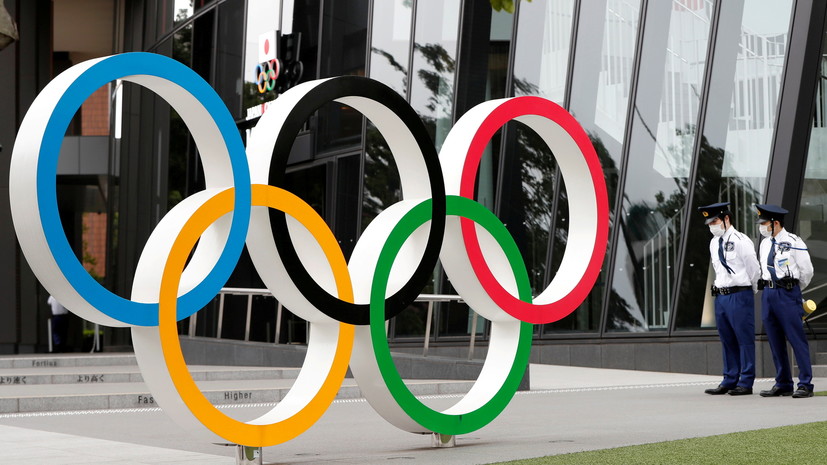Less than two months are left before the start of the XXXII Summer Olympic Games in Tokyo, but the expediency of holding them still raises many doubts and disputes.
If officials of the International Olympic Committee (IOC) assure that the risks associated with the coronavirus pandemic will be minimized, then doctors and residents of Japan insist on the need to reschedule or even celebrate the largest sports forum.
Their fears are not unfounded.
The epidemiological situation in the country remains serious, which led to another extension of the emergency regime in nine prefectures, including Tokyo.
And although, according to local politicians, the number of cases is not critically increasing, it still remains quite high.
In turn, sports organizations are doing everything possible to protect the participants in the Olympics.
So, among the already announced measures - reduction of the number of athletes and national delegations, accommodation in a closed zone - "bubble", a ban on the entry of foreign fans.
Particular attention is paid to testing the guests of Tokyo.
In accordance with the regulations, they will need to be tested twice for coronavirus no later than 96 hours before dispatch, and they will be tested daily in the Olympic village.
The decision on the presence of Japanese fans in the stands will be made at the end of June.
In addition, the organizers continue to work out several options for action in case the situation worsens during the days of the Games.
At the same time, one of the latest rules, which the IOC plans to introduce in the near future, may raise many questions from the sports community.
According to Japanese media reports, the organization intends to oblige athletes to take responsibility for their health.
Each participant will have to sign a document stating that he is aware of the risks, including fatal ones, associated with coming to Tokyo for the Games during a pandemic.
“As you probably know from the news around the world about COVID-19, no government, no health department can and has not made guarantees about cases of infection.
We all face this risk, ”IOC Chief Operating Officer Lana Haddad is quoted by Kyodo as saying.
Nevertheless, all these precautions sound unconvincing for the people of the country.
Thus, one of the latest polls showed that 83% of respondents opposed the Olympics in 2021, while more than half of them agreed that the forum should be completely canceled.
And one of the latest petitions addressed to the leadership of the IOC and the Japanese authorities has already collected more than 400 thousand signatures.
According to its author, public figure Kenji Utsunomiya, in the current situation, it is impossible to safely conduct the competition.
In addition, athletes who fail to perform well under severe restrictions may also suffer.
Local MPs and even some sponsors joined the citizens of the country.
The Tokyo Medical Workers' Association called for the Games to be canceled, and the head of the Japanese Medical Union, Naoto Uyama, suggested that their holding would lead to serious consequences, up to the emergence of a new strain of coronavirus.
“Here, in Tokyo, there will be a concentration and accumulation of the entire variety of variants of the mutated virus from different regions.
We cannot rule out the possibility that a new strain will emerge after the Olympics.
In this case, it may even go so far that this Tokyo Olympic strain will be called that way.
Such an unfortunate development of events can become a reason for criticism for as long as 100 years, ”the Japan Times quoted Uyama as saying.
Nevertheless, despite the growing wave of discontent, the IOC itself continues to remain calm.
According to the president of the organization, Thomas Bach, at the moment there is no reason to believe that the Games will not be safe for athletes and Japanese citizens.
And the former head of the World Anti-Doping Agency (WADA), Richard Pound, even sharply criticized the supporters of the cancellation of the Games, suggesting that they may have political motives.
“If you are a citizen or a resident of Japan, you are capable of a number of, as we know, effective
measures to prevent the spread of the virus, including social distancing, wearing masks, and, for that matter, refusing to travel to Tokyo, ”said Pound.
It is worth noting that the postponement or cancellation of the Olympics is indeed associated with large losses that the organizers will incur.
According to the Nomura Research Institute, Japan risks losing about $ 17 billion. And this, in turn, could be another serious blow to the country's economy.
Do not forget that in 2020, due to the pandemic, there was practically no sport left in which competitions were not canceled, and athletes were not only deprived of competitive practice, but often did not have the opportunity to fully train.
And although in 2021 most of the tournaments, including the world championships, returned to the calendar, the next postponement of the main start of the four-year period, for which all forces have been thrown into preparation, can negatively affect its main heroes - athletes.
Recall that the XXXII Olympiad was to be held from July 24 to August 9, 2020. But on March 24, after negotiations between the IOC and the Japanese authorities, as well as the refusal of several national teams to come to Tokyo, it was decided to postpone the competition until 2021. A similar fate befell the 16th Paralympic Summer Games.

